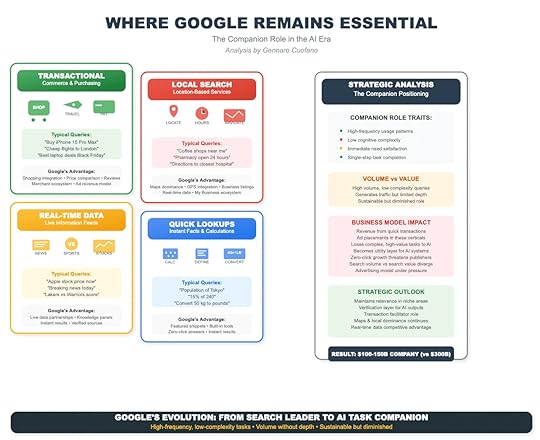Where Google Remains Essential: The Companion Role in the AI Era

For over two decades, Google defined the digital experience. The search box wasn’t just a tool — it was the starting point for almost everything online. But in the AI era, the search box is shrinking. As AI handles complex, multi-step tasks, Google’s dominance shifts from gateway to companion.
This does not mean irrelevance. Google will remain essential, but in a narrower band of high-frequency, low-complexity queries. The future is not about search as the hub of the internet, but about search as a supporting layer for AI systems.
The Companion Role DefinedGoogle’s enduring strengths are rooted in queries that share four traits:
High frequency — they happen constantly, multiple times a day.Low complexity — they can be answered in a single step.Immediate need — users want instant resolution.Task completion — the output satisfies the query without further stitching.This “companion role” doesn’t make Google irrelevant. But it does make Google narrower, focused on tasks AI doesn’t fully absorb.
The Four Pillars of Essential Google1. Transactional Queries: Commerce and PurchasingWhen users want to buy, Google still owns the funnel. From “best laptop deals” to “cheap flights to London,” Google’s integration of shopping ads, price comparison, merchant reviews, and payment flows gives it an edge.
Advantage: deep merchant ecosystem + proven ad revenue model.Limitation: as AI shopping companions mature, Google risks losing discovery while retaining only checkout facilitation.2. Local Search: Location-Based ServicesFew competitors can match Google’s dominance in maps and local navigation. Queries like “coffee shops near me” or “directions to closest hospital” remain firmly in Google’s grip.
Advantage: GPS integration, Maps dominance, Google My Business listings.Limitation: AI could intermediate by fetching results from Google Maps without users directly searching.3. Real-Time Data: Live Information FeedsWhen immediacy matters, Google’s access to live data partnerships gives it a unique moat. From stock prices to breaking news, Google provides verified, instant snippets.
Advantage: partnerships with financial data providers, sports feeds, and news outlets.Limitation: as real-time APIs open up, AI systems could bypass Google — unless Google positions itself as the verification layer.4. Quick Lookups: Facts and CalculationsGoogle excels at instant answers: population sizes, unit conversions, definitions. These are single-step tasks where the user wants precision and speed.
Advantage: featured snippets, knowledge graphs, built-in tools.Limitation: AI can replicate this seamlessly, unless Google ensures its data remains the canonical source.Volume Without DepthThese areas represent massive volume, but limited depth.
Millions of people will still check directions, sports scores, and quick facts daily.But the strategic value of these queries is shallow. They generate ad impressions, not deep user journeys.This is the essence of Google’s future: sustainable, but diminished.
Business Model ImpactThe shift to a companion role has profound implications:
Revenue PressureGoogle monetizes through ad placements in these verticals.As complex, high-value tasks migrate to AI, Google loses margin-rich categories like research, planning, and decision-making.Zero-Click GrowthGoogle already faces rising zero-click behavior.In the AI era, Google risks being reduced to a background layer, cited by AI but not directly visited.Volume vs. Value DivergenceSearch volume may remain high.Search value, however, shifts to AI systems that capture context-rich tasks.The Strategic OutlookGoogle’s path forward rests on leaning into the companion role while monetizing its structural moats.
Verification Layer — becoming the trusted source AI systems cite.Transaction Facilitator — owning checkout flows and payment rails.Maps & Local Dominance — ensuring location data remains indispensable.Real-Time Advantage — deepening exclusive live-data partnerships.In this scenario, Google remains a $100–150B company — still huge, but not the $300B giant it once was.
What This Means for BusinessesOptimize for AI and Google TogetherBeing AI-citable requires structured data and authoritative content.Google optimization still matters for local, transactional, and quick-look tasks.Rethink Customer JourneysComplex queries (“Which CRM should we use?”) will increasingly start and end in AI systems.Businesses should adapt to a world where Google drives fewer discovery journeys.Plan for Dual VisibilityAI-first for context-rich, multi-step tasks.Google-first for high-frequency, transactional, and local visibility.The Companion FutureGoogle isn’t going away. It’s transforming.
From search leader to AI task companion.
From gateway to the web to utility layer for AI.
From deep discovery to fast resolution.
Google will still power millions of micro-moments daily — but the future of strategic value is elsewhere.
In the AI era, volume survives, depth migrates.
That is the paradox of Google’s companion role.

The post Where Google Remains Essential: The Companion Role in the AI Era appeared first on FourWeekMBA.



